Unit-5-The-Real-Truth-About-Lies课文翻译综合教程三
Unit 5 The Real Truth about Lies解析
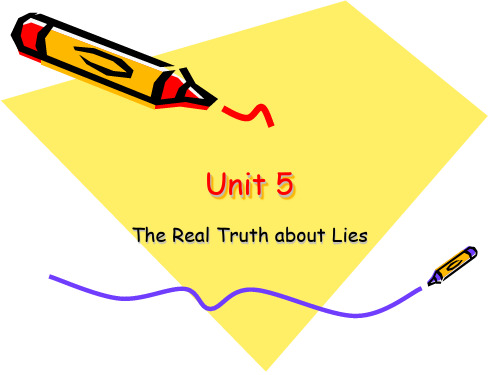
Part Two
ubiquitous: seeming to be everywhere似乎无所 不在的,十分普遍的, 相当于“common” e.g. :Smoking in public is a ubiquitous problem. 在公共场合吸烟是一个无处不在的问题。 ubiquitously (adv) 无处不在地 ubiquity (n). 普遍存在;到处存在 Invariably: constantly, always一贯地,始终如一地 e.g. :Invariably I get up at 6:00 in the morning. 我一贯早上六点钟起床。 blurt out:脱口而出 e.g.: He blurted out the secret before we could stop him. 在我们制止他之前,他已将秘密脱口而出。
② a distinguishing quality of being excellent or important 优秀;杰出;卓越:
eg:a singer of distinction 优秀歌唱家
• Coarsen
• To become or make sth. become thicker or rougher 变厚;变粗糙: • Eg: Her hands were coarsened by hard work. • 繁重的劳动使她的双手变得粗糙了。
prevarication:the state of avoiding giving a direct answer or making a frim decision. eg:His prevarication on this matter made us angry. be devoted to:致力于,专心于 characterize sb./sth.as:描述,刻画...的特 征
Unit 5 The real truth about lies练习答案综合教程三

Unit 5 The real truth about lies练习答案综合教程三Unit 5 The Real Truth About LiesIn today's society, lies are a common occurrence in both our personal and professional lives. We often find ourselves questioning the truthfulness of others and even lying ourselves. This unit will explore the different aspects of lies, including their impact on relationships, the psychology behind lying, and strategies for detecting deception.1. The Impact of Lies on RelationshipsLies can have a profound impact on relationships, be it friendships, romantic relationships, or professional partnerships. When trust is broken through deception, it can be challenging to rebuild. Lies can create distance, erode intimacy, and lead to a breakdown in communication.Furthermore, lies can cause emotional harm. Discovering that someone close to us has been dishonest can result in feelings of betrayal, anger, and disappointment. If lies persist, it can destroy the foundation of any relationship, making it difficult for both parties to move forward.2. The Psychology of LyingUnderstanding the psychology behind lying can shed light on why people choose to deceive others. Lying is often a deliberate act intended to manipulate the truth and gain some personal advantage. Psychologists have identified various reasons why individuals lie, which include:a) Self-interest: People may lie to protect themselves from negative consequences or to achieve personal gain.b) Fear: Fear of punishment or the desire to avoid conflict can lead individuals to tell lies.c) Desire for approval: Some people lie to gain acceptance or be seen in a more favorable light by others.d) Protection: Individuals may lie to protect themselves or someone they care about from harm or embarrassment.3. Strategies for Detecting DeceptionIt is not always easy to detect lies, as skilled liars can be convincing. However, there are strategies that can help increase our ability to detect deception:a) Nonverbal cues: Pay attention to a person's body language, facial expressions, and tone of voice. Inconsistent or overly animated gestures, avoidance of eye contact, or a shaky voice may indicate deception.b) Inconsistencies in storytelling: Liars may have difficulty maintaining a consistent narrative or may contradict themselves when questioned in detail.c) Microexpressions: These fleeting facial expressions can reveal true emotions that may conflict with the lie being told.d) Gut instincts: Trust your instincts and listen to any feelings of suspicion or discomfort you may have when someone is speaking.4. Honesty and Building TrustOpen and honest communication is essential for building and maintaining trust in relationships. To promote a culture of honesty, it is crucial to:a) Lead by example: Be truthful and transparent in your own words and actions.b) Encourage honesty: Create an environment where it is safe for others to be honest without fear of judgment or punishment.c) Build trust gradually: Trust takes time to develop, so be patient and consistent in your actions.d) Address past lies: When trust has been broken, have open and honest conversations about the impact of the deception and work together to rebuild trust.In conclusion, lies have the power to damage relationships, hinder communication, and erode trust. Understanding the impact of lies on relationships, the psychology behind lying, and strategies for detecting deception can help foster a culture of honesty and build stronger connections with others. It is imperative to remember that honesty and trust are essential in all aspects of our lives. Through open and transparent communication, we can navigate the complexities of lies and ultimately maintain healthier and more fulfilling relationships.。
Unit_5_the_real_truth_about_lies

• Fill in each blank in the passage below with one word you think appropriate. • Service; rather; off; are; advantage; much; relations; if; as; moral; either; truth
• I. Explain the underlined part in each sentence in your own words. • 1. very important/shocking/traumatic 2. avoid hurting the other's feelings/avoid doing something that would upset the other person; 3. modifying the truth/telling the turth with a favorable emphasis or slant; 4. a course of action which can easily lead to something unacceptable, wrong or disastrous; 5. under any circumstances/whatever might happen;
• II.supportive; perceived; prevarication; astounded; undermine; faltered; fibs; volunteered.
• III.unethical; feigned; unsparing; cynical; confoundedly; lubricated; entangled; willfui
Unit-5-The-real-truth-about-lies练习标准答案综合教程三
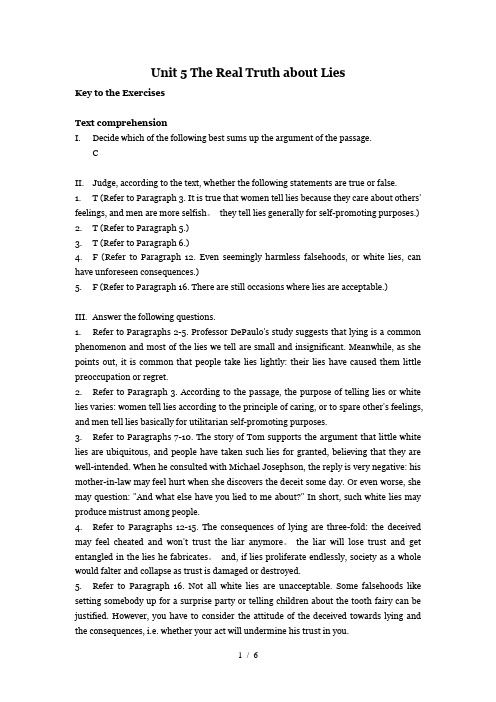
Unit 5 The Real Truth about LiesKey to the ExercisesText comprehensionI. Decide which of the following best sums up the argument of the passage.CII. Judge, according to the text, whether the following statements are true or false.1. T (Refer to Paragraph 3. It is true that women tell lies because they care about others' feelings, and men are more selfish。
they tell lies generally for self-promoting purposes.)2. T (Refer to Paragraph 5.)3. T (Refer to Paragraph 6.)4. F (Refer to Paragraph 12. Even seemingly harmless falsehoods, or white lies, can have unforeseen consequences.)5. F (Refer to Paragraph 16. There are still occasions where lies are acceptable.)III. Answer the following questions.1. Refer to Paragraphs 2-5. Professor DePaulo's study suggests that lying is a common phenomenon and most of the lies we tell are small and insignificant. Meanwhile, as she points out, it is common that people take lies lightly: their lies have caused them little preoccupation or regret.2. Refer to Paragraph3. According to the passage, the purpose of telling lies or white lies varies: women tell lies according to the principle of caring, or to spare other's feelings, and men tell lies basically for utilitarian self-promoting purposes.3. Refer to Paragraphs 7-10. The story of Tom supports the argument that little white lies are ubiquitous, and people have taken such lies for granted, believing that they are well-intended. When he consulted with Michael Josephson, the reply is very negative: his mother-in-law may feel hurt when she discovers the deceit some day. Or even worse, she may question: "And what else have you lied to me about?" In short, such white lies may produce mistrust among people.4. Refer to Paragraphs 12-15. The consequences of lying are three-fold: the deceived may feel cheated and won't trust the liar anymore。
Unit 5 The Real Truth About Lies课文翻译综合教程三

Unit 5The Real Truth about LiesRandy FitzgeraldAt the University of Virginia in Charlottesville, psychology professor Bella DePaulo got 77 students and 70 townspeople to volunteer for an unusual project. All kept diaries for a week, recording the numbers and details of the lies they told.One student and six Charlottesville residents professed to have told no falsehoods. The other 140 participants told 1,535.The lies were most often not what most of us would call earth-shattering. Someone would pretend to be more positive or supportive of a spouse or friend than he or she really was, or feign agreement with a relative's opinion. According to DePaulo, women in their interactions with other women lied mostly to spare the other's feelings. Men lied to other men generally for self-promoting reasons.Most strikingly, these tellers-of-a-thousand-lies reported that their deceptions caused them "little preoccupation or regret". Might that, too, be a lie? Perhaps. But there is evidence that this attitude toward casual use of prevarication is common.For example, 20,000 middle- and high-schoolers were surveyed by the Josephson Institute of Ethics--a nonprofit organization in Marina del Rey, California, devoted to character education. Ninety-two percent of the teenagers admitted having lied to their parents in the previous year, and 73 percent characterized themselves as "serial liars", meaning they told lies weekly. Despite these admissions, 91 percent of all respondents said they were "satisfied with my own ethics and character".Think how often we hear the expressions "I'll call you" or "The check is in the mail”or "I'm sorry, but he stepped out". And then there are professions-- lawyers, pundits, PR consultants--whose members seem to specialize in shaping or spinning the truth to suit clients' needs.Little white lies have become ubiquitous, and the reasons we give each other for telling fibs are familiar. Consider, for example, a Southern California corporate executive whom I'll call Tom. He goes with his wife and son to his mother-in-law's home for Thanksgiving dinner every year. Tom dislikes her “special”pumpkin pie intensely. Invariably he tells her how wonderful it is, to avoid hurting her feelings."What's wrong with that?" Tom asked Michael Josephson, president of the Josephson Institute. It's a question we might all ask.Josephson replied by asking Tom to consider the lie from his mother-in-law's pointof view. Suppose that one day Tom's child blurts out the truth, and she discovers the deceit. Will she tell her son-in-law, "Thank you for caring so much?" Or is she more likely to feel hurt and say, "How could you have misled me all these years? And what else have you lied to me about?"And what might Tom's mother-in-law now suspect about her own daughter? And will Tom's boy lie to his parents and yet be satisfied with his own character?How often do we compliment people on how well they look, or express our appreciation for gifts, when we don't really mean it? Surely, these "nice" lies are harmless and well intended, a necessary social lubricant. But, like Tom, we should remember the words of English novelist Sir Walter Scott, who wrote, "What a tangled web we weave, when first we practice to deceive."Even seemingly harmless falsehoods can have unforeseen consequences. Philosopher Sissela Bok warns us that they can put us on a slippery slope. "After the first lies, others can come more easily,” she wrote in her book Lying: Moral Choice in Public and Private Life. “Psychological barriers wear down; the ability to make more distinctions can coarsen; the liar's perception of his chances of being caught may warp."Take the pumpkin pie lies. In the first place, it wasn't just that he wanted his mother-in-law to feel good. Whether he realized it or not, he really wanted her to think highly of him. And after the initial deceit he needed to tell more lies to cover up the first one.Who believes it anymore when they're told that the person they want to reach by phone is "in a meeting"? By itself, that kind of lie is of no great consequence. Still, the endless proliferation of these little prevarications does matter.Once they've become common enough, even the small untruths that are not meant to hurt encourage a certain cynicism and loss of trust. "When (trust) is damaged,”warns Bok, “the community as a whole suffers; and when it is destroyed, societies falter and collapse."Are all white lies to be avoided at all costs? Not necessarily. The most understandable and forgivable lies are an exchange of what ethicists refer to as the principle of trust for the principle of caring, "like telling children about the tooth fairy, or deceiving someone to set them up for a surprise party," Josephson says. "Still, we must ask ourselves if we are willing to give our friends and associates the authority to lie to us whenever they think it is for our own good."Josephson suggests a simple test. If someone you lie to finds out the truth, will he thank you for caring? Or will he feel his long-term trust in you has been under-mined?And if you're not sure, Mark Twain has given us a good rule of thumb. "When in doubt, tell the truth. It will confound your enemies and astound your friends."谎言的真相兰迪·菲茨杰拉德1. 在夏洛特斯维尔的弗吉尼亚大学里,心理学教授贝拉·德保罗组织了77名学生和70名市民志愿参加一个特别的项目。
Unit 5 The Real Truth About Lies课文翻译综合教程三

Unit 5 The Real Truth About Lies课文翻译综合教程三随着科技的发展,信息的获取和传播变得越来越容易。
然而,在这个充满信息的时代,真相与谎言之间的界限变得模糊不清。
本单元的课文《谎言的真相》,揭示了关于谎言的真实情况,引发人们思考和反思。
在人们日常生活中,谎言无处不在。
有时,人们说谎是为了保护自己或者他人,有时则是为了追求个人利益或满足某种心理需求。
无论出于何种原因,谎言所带来的后果都是严重的。
在文章中,作者提到了一个真实的案例,描述了一名因为说谎被判刑的男子。
通过这个案例,读者可以看到谎言对个人和社会的危害。
与此同时,课文也强调了社交媒体时代的谎言。
在社交媒体上,人们经常选择性地展示自己的生活,刻意修饰照片和事实,以达到吸引他人注意和认可的目的。
然而,这种虚假的展示并没有给人们带来真正的满足感,反而加剧了人们的焦虑和不真实感。
因此,文章呼吁人们在使用社交媒体时保持真实,追求真实的交流和连接。
除了个人行为外,政治领域也充斥着谎言。
政治家和政府常常利用谎言来掩盖真相,为自己的利益服务。
这种“政治谎言”不仅损害了公众的信任,也导致了社会的混乱和分裂。
在文章中,作者引用了一些政治谎言的例子,并强调了媒体的责任,传播真相和揭露谎言。
只有通过媒体的监督和公众的关注,才能防止政治谎言的蔓延。
此外,课文还探讨了有关道德和伦理的问题。
在某种情况下,有些人可能会为了自己的利益而选择撒谎,而另一些人则会保守秘密,选择回避真相。
然而,伦理和道德要求我们坦诚和正直,不论真相有多么艰难或痛苦。
只有坦诚面对,才能真正解决问题和建立良好的人际关系。
总而言之,课文《谎言的真相》通过探讨谎言在不同领域中的影响,唤起了读者对于真相和谎言的思考。
它提醒我们在信息泛滥的背景下保持警惕,并强调了坦诚和真实的重要性。
只有通过打破谎言的迷雾,才能建立一个诚信和正直的社会。
综合英语三U5课后答案
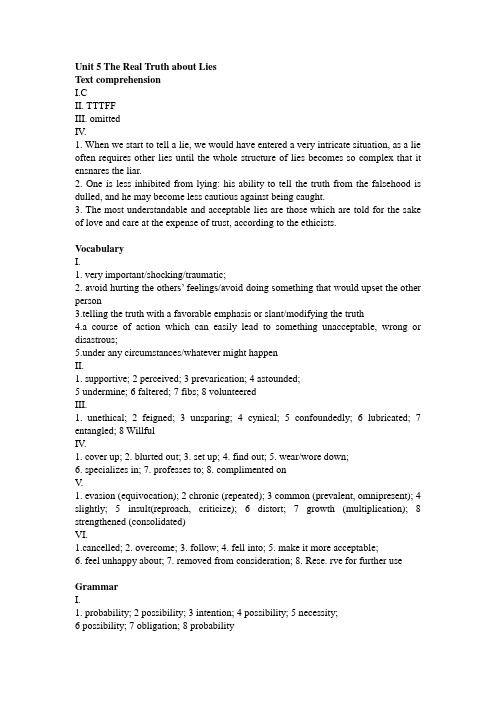
Unit 5 The Real Truth about LiesText comprehensionI.CII. TTTFFIII. omittedIV.1. When we start to tell a lie, we would have entered a very intricate situation, as a lie often requires other lies until the whole structure of lies becomes so complex tha t it ensnares the liar.2. One is less inhibited from lying: his ability to tell the truth from the falsehood is dulled, and he may become less cautious against being caught.3. The most understandable and acceptable lies are those which are told for the sake of love and care at the expense of trust, according to the ethicists.VocabularyI.1. very important/shocking/traumatic;2. avoid hurting the others’ feelings/avoid doing something that would upset the other person3.telling the truth with a favorable emphasis or slant/modifying the truth4.a course of action which can easily lead to something unacceptable, wrong or disastrous;5.under any circumstances/whatever might happenII.1. supportive; 2 perceived; 3 prevarication; 4 astounded;5 undermine;6 faltered;7 fibs;8 volunteeredIII.1. unethical; 2 feigned; 3 unsparing; 4 cynical; 5 confoundedly; 6 lubricated; 7 entangled; 8 WillfulIV.1. cover up;2. blurted out;3. set up;4. find out;5. wear/wore down;6. specializes in;7. professes to;8. complimented onV.1. evasion (equivocation); 2 chronic (repeated); 3 common (prevalent, omnipresent); 4 slightly; 5 insult(reproach, criticize); 6 distort; 7 growth (multiplication); 8 strengthened (consolidated)VI.1.cancelled;2. overcome;3. follow;4. fell into;5. make it more acceptable;6. feel unhappy about;7. removed from consideration;8. Rese. rve for further use GrammarI.1. probability; 2 possibility; 3 intention; 4 possibility; 5 necessity;6 possibility;7 obligation;8 probabilityII.CCBAD BBBAAIII.1. He can’t have told us everything.2. Something must have gone wrong.3. She can’t be only thirty years old.4. They may not know yet.5. The road could/may have been closed.6. The police must know that.7. There may/could have been a traffic jam.8. The letter could/may arrive today.9. That will/must be my mother.10. There should be time to do some shopping.IV.1. When in doubt, tell the truth. It will confound your enemies and astound your friends.2. When heated, metal expands.3. If true, it will cause us a lot of trouble4. Whenever possible, they should be typed5. When in Rome, do as the Romans do6. Send the goods now, if ready7. If necessary, ring me at home.8. He glanced about as if in search of something.V.1.discussing, having reached2.paying3.Lying, sitting4.to pacify, to be pacified, grumbling5.repeat, to make, to do6.going, stay7.to see, to avoid, hitting8.to arrive, rising9.doing10.to make, to seeTranslationI. E-C1. Most strikingly, these tellers-of-a-thousand-lies reported that their deceptions caused them “littl e preoccupation or regret.”十分惊人的是,这些无数次说谎的人称,说谎并没有使他们十分纠结或后悔。
全新版大学英语综合教程5课文翻译

Unit 3PartⅡTextA The Truth About Lying关于说谎的真相朱迪斯?维奥斯特我一直想写一个令我深感兴趣的话题:关于说谎的问题。
我觉得这个题目很难写。
所有我交谈过的人都对什么事情可以说谎——什么事情绝对不可以说谎——持有强烈的、常常不容别人分说的个人意见。
最后我得出结论,我不能下任何定论,因为这样做就会有太多的人立即反对。
我想我还是提出若干都与说谎有关的道义上的难题吧。
我将向读者阐明我对这些难题的个人看法。
你们觉得对吗?社交性谎言和我交谈过的大多数人都说,他们认为旨在促进社会交际的谎言是可以接受的,也是必要的。
他们认为这是一种文明的行为。
他们说,要不是这类无关紧要的谎言,人与人之间的关系就会变得粗野不快,无法持久。
他们说,如果你要做到十二分正直、十二分无畏,不由自主地用你的诚实使他人陷入不必要的窘境或痛苦之中,这只能说你是傲慢自大。
对此,我基本赞同。
你呢?你会不会跟人说:“我喜欢你的新发型,”“你气色好多了,”“见到你真高兴,”“我玩得很尽兴,”而实际上根本不是这么回事儿?你会不会对令人憎厌的礼物,或相貌平平的孩子称赞有加?你婉辞邀请时会不会说“那天晚上我们正好没空——真对不起,我们不能来,”而实际上你是宁肯呆在家里也不想跟某某夫妇一起进餐?虽然像我那样,你也想用“太丰盛了”这种委婉的托辞,而不是盛赞“那汤味道好极了”(其实味同重新热过的咖啡),但如果你必须赞美那汤,你会说它鲜美吗?我认识一个人,他完全拒绝说这类社交性谎言。
“我不会那一套,”他说,“我生来就不会那一套。
”讲到对人家说几句好听的话并不失去什么,他的回答是:“不对,当然有损失——那会损害你的诚信度。
”因此你不问他,他不会对你刚买来的画发表意见,但除非你想听老实话,否则你也不会去问他的真实想法。
当我们这些说谎者轻声称赞着“多美啊”的时候,他的沉默往往是极能说明问题的。
我的这位朋友从来不讲他所说的“奉承话、虚假的赞美话和动听话”。
Unit 5 The real truth about lies Words and Expressions综合教程三
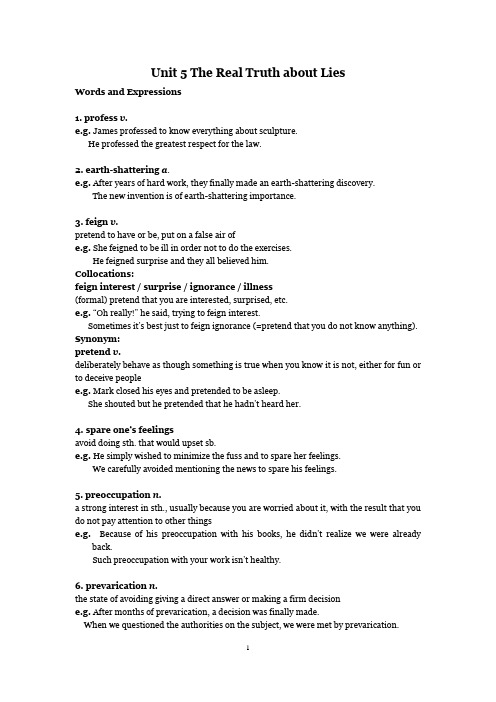
Unit 5 The Real Truth about LiesWords and Expressions1. profess v.e.g. James professed to know everything about sculpture.He professed the greatest respect for the law.2. earth-shattering a.e.g. After years of hard work, they finally made an earth-shattering discovery.The new invention is of earth-shattering importance.3. feign v.pretend to have or be, put on a false air ofe.g. She feigned to be ill in order not to do the exercises.He feigned surprise and they all believed him.Collocations:feign interest / surprise / ignorance / illness(formal) pretend that you are interested, surprised, etc.e.g.“Oh really!” he said, trying to feign interest.Sometimes it’s best just to feign ignorance (=pretend that you do not know anything). Synonym:pretend v.deliberately behave as though something is true when you know it is not, either for fun or to deceive peoplee.g. Mark closed his eyes and pretended to be asleep.She shouted but he pretended that he hadn’t heard her.4. spare one’s feeling savoid doing sth. that would upset sb.e.g. He simply wished to minimize the fuss and to spare her feelings.We carefully avoided mentioning the news to spare his feelings.5. preoccupation n.a strong interest in sth., usually because you are worried about it, with the result that you do not pay attention to other thingse.g. Because of his preoccupation with his books, he didn’t realize we were alreadyback.Such preoccupation with your work isn’t healthy.6. prevarication n.the state of avoiding giving a direct answer or making a firm decisione.g. After months of prevarication, a decision was finally made.When we questioned the authorities on the subject, we were met by prevarication.7. devote … togive all or a large part of one’s time or r esources to (a person, activity, or cause)e.g. I want to devote more time to my family.He devotes himself to philanthropy.8. profession n.a form of employment, esp. one that is possible only for an educated person and that is respected in society as honorablee.g. She intends to make teaching her profession.According to the report, forty percent of the lawyers entering the profession are women.9. pundit n.a person who is an authority on a particular subject; an experte.g. Mr. Johnson is a well-known political pundit.We’ve invited a foreign-policy pundit to give us a lecture.10. shape or spin the truthmodify the truth11. client n.sb. who pays for services or advice from a person or an organizatione.g. a solicitor and his client12. ubiquitous a.seeming to be everywheree.g. By the end of last century, the computer had become ubiquitous.We are now confronted with the ubiquitous spread of English.13. fib n.a small unimportant liee.g. Have you ever told fibs?She told innocent fibs like anyone else.14. invariably ad.alwayse.g. It’s invariably wet when I take my holidays.She invariably forgets to take her keys.15. blurt out v.say sth. suddenly and without thinking, usually because one is nervous or excitede.g. To our surprise, he blurted his secret out at table.John blurted out that he dreamed of becoming a computer programmer.16. lubricant n.a substance such as oil that one puts on surfaces that rub togethere.g. That all-important task acts as a social lubricant, minimizing frictions.17. tangled a.complicated or made up of many confusing partse.g. After listening to his speech I thought his ideas and opinions were so tangled that Icould not vote for him.The floor of the forest was covered with tangled growth.18. wear downreduce or become weaker until uselesse.g. My shoes have worn down at the heel.Your back tyres are badly worn down; you should fit new ones.19. warp v.bend or twist and to be no longer in the correct shapee.g. Left in the garage where it was damp, the wooden frame had warped.The door must be warped. It won’t close properly.20. think highly ofhave a good opinion ofe.g. We think highly of your suggestion.I can assure you, the management thinks very highly of you.21. proliferation n.a rapid increase in the amount or number of sth.e.g. Smoking triggers off cell proliferation.Over the past two years, we have witnessed the proliferation of TV channels.22. cynicism n.the belief that people always act selfishly23. .associate n.sb. who you work or do business withe.g. He is not a friend, but a business associate.George’s party was boring— it was full of his business associates.24. undermine v.gradually make sb. or sth. less strong or effectivee.g. She jealously tried to undermine our friendship.Lack of food has undermined his health.25. rule of thumba rough method of calculation, based on practical experiencee.g. I never weigh anything when I’m cooking— just do it by rule of thumb.As a rule of thumb, a cup of filter coffee contains about 89mg caffeine.26. astound v.make sb. very surprised or shockede.g. It astounds me that anyone could every consider declaring war.He used to astound his friends with feats of physical endurance.。
(完整word)新人教版高中英语必修五完整课文译文

新人教版高中英语课文译文必修五第一单元伟大的科学家Reading 约翰.斯诺击败“霍乱王”约翰.斯诺是伦敦一位著名的医生—他的确医术精湛,因而成为照料维多利亚女皇的私人医生。
但当他一想到要帮助那些得了霍乱的普通百姓时,他就感到很振奋。
霍乱在当时是最致命的疾病,人们既不知道它的病源,也不了解它的治疗方法。
每次暴发霍乱时,就有大批惊恐的老百姓病死。
约翰.斯诺想面对这个挑战,解决这个问题。
他知道,在找到病源之前,霍乱疫情是无法控制的。
斯诺对霍乱致人死地的两种推测都很感兴趣。
一种看法是霍乱病毒在空气中腐殖着,像一股危险的气流到处漂浮,直到找到病毒的受害者为止。
第二种看法是在吃饭的时候人们把这种病毒引入体内的。
病从胃里发作而迅速殃及全身,患者就会很快地死去。
斯诺推测第二种说法是正确的,但是他需要证据。
因此,在1854年伦敦再次暴发霍乱的时候,约翰.斯诺着手准备对此调研。
当霍乱在贫民区迅速蔓延的时候,约翰.斯诺就开始收集资料。
他发现特别在两条街道上霍乱流行的很严重,在10天之内就死去了500多人。
他决心要查明其原因。
首先,他在一张地图上标明了所有死者住过的地方。
这提供了一条说明霍乱起因的很有价值的线索。
许多死者是住在宽街的水泵附近(特别是这条街上16、37、38、40号)。
他发现有些住宅(如宽街上20号和21号以及剑桥上的8号和9号)却无人死亡。
他以前没预料到这种情况,所以他决定深入调查。
他发现,这些人都在剑桥街7号的酒馆里打工,而酒馆为他们免费提供啤酒喝,因此他们没有喝从宽街水泵抽上来的水。
看来水是罪魁祸首。
接下来,约翰.斯诺调查了这两条街的水源情况。
他发现,水是从河里来的,而河水被伦敦排出的脏水污染了。
他马上叫宽街上惊慌失措的老百姓拆掉水泵上的把手。
这样,水泵就用不成了。
不久,疫情就开始得到了缓解。
他证明了,霍乱是由病菌而不是由气团传播的。
在伦敦的另一个地区,他从两个与宽街暴发的霍乱有关联的死亡病例中发现了有力的证据。
Unit 5 The Real Truth about Lies Teaching plan综合教程三

Unit 5 The Real Truth about LiesTeaching PointsBy the end of this unit, students are supposed to1)grasp the author‟s purpose of writing and make clear the structure of the wholepassage through an intensive reading of Text I The Real Truth About Lies.2)comprehend those useful or important expressions/sentences in Text Ithoroughly and be able to paraphrase them.3)be aware of new words and structures and use them freely in conversation andwriting.4)reconsider the dilemma: to lie or not to lie.Topics for pre-reading discussion1)Have you ever been lying to others with a seemingly good intention? How‟s theconsequence?2)If somebody lies to you for your own good, how would you feel?Cultural Background1. A white lie is one that lacks evil intent, as opposed to a black lie, which is most certainly malevolent, though normally we don‟t bother to specify that lies are evil. A white lie is harmless or trivial, which is frequently said in order to avoid hurting someone‟s feelings.2. Behavioral scientist Wendy Gamble identified four basic types of lies for a University ofArizona study in 2000:Prosocial:Lying to protect someone, to benefit or help others.Self-enhancement:Lying to save face, to avoid embarrassment, disapproval or punishment.Selfish:Lying to protect the self at the expense of another, and/or to conceal a misdeed. Antisocial:Lying to hurt someone else intentionally.Text IThe Real Truth about LiesRandy FitzgeraldGlobal ReadingI. Text Analysis / Main IdeaThis is a piece of persuasive writing. It is of journalistic style.In this text, the author asserts the ubiquitous presence of petty white lies, analyzes its causes, discusses its grave consequences, and concludes that some lies are justifiable, while others are to be avoided.II. Structural AnalysisThe author begins with the results of two surveys. Then he comments on the consequences of telling lies. In the end, he discusses which lies should be avoided.Part I (Paras. 1-6) introduces the topic by reporting two survey results.Part II (Paras. 7-11) shows that people often tell white lies so as not to hurt others.Part III (Paras. 12-15) deals with the consequences of telling lies.Part IV (Paras. 16-18) discusses whether lies should be avoided at all costs.Detailed ReadingQuestions1.What is the result of Professor Bella DePaulo‟s survey? What conclusion can wedraw from the result? (Paragraphs 1-2)According to the survey done by Professor DePaulo, 140 out of 147 people admitted having told lies. As some of the lies are well-intentioned, people may not regard them as lies. This result shows that telling lies is common.2.What is the result of the survey conducted by Josephson Institute of Ethics? Whatcan we learn from it? (Paragraph 5)According to this survey, among 20,000 students surveyed, 92 percent professed to have told lies and meanwhile, 91 percent never doubted about their own ethics orcharacter. Again, this result shows that telling lies is common and people seldom relate telling lies to morality.3.According to the writer, what could be considered “nice lies”? (Paragraph 11)According to the writer, all these could be considered “nice lies”: complimentingpeople on their appearance, expressing appreciation for gifts or food.4.What is the grave consequence of telling lies? (Paragraph 15)The ubiquitousness of lies may cause people to be distrustful of each other, thusleading to the collapse of the whole society.Text IITo Lie or Not to Lie? —The Doctor’s DilemmaSissela BokA Lead-in QuestionDo doctors have“license to lie”, for the sake of their patients?Main ideaThis text is about the question of whether patients should be told the truth about their illnesses. Many physicians may slip into deceptive practices in the belief that this may benefit them psychologically and help them recover. But new studies show that most patients want to know the truth even in the case of grave illnesses. The writer argues that lying makes it difficult for the patients to make choices for their own health, and can also cause doctors to lose their integrity and credibility.Notes1. Sissela Bok: Sissela Bok, born 2 December 1934, is a Swedish-born philosopher andethicist. Formerly a Professor of Philosophy at Brandeis University, Bok is currently a Senior Visiting Fellow at the Harvard Center for Population and Development Studies.One of her great contributions has been a continued exploration of 'practical ethics' or applied moral philosophy.2. But the illusory nature of the benefits such deception is meant to bestowis now coming to be documented. (Paragraph 6) The subject of the sentence is the illusory nature and the predicate, is now coming to be documented and the whole sentence means that the benefits lying is supposed to have are now proving to be unreal and imagined.3. …it contributes to the spiral of litigation and of “defensive medicine”…(Paragraph 9)“T he spiral of litigation” means two opposing parties in a law suit are inv olved in an endless process of litigation which is getting higher and higher in level. The phrase “defensivemedicine” refers to the alterations of modes of medical practice for the purposes of avoiding lawsuits by patients as well as providing good legal defense if such lawsuits are instituted.4. Patients’ bills of rights require that…(Paragraph 10) “B ills of rights”isstatements of the rights of a class of people, in particular the first ten amendments to the Constitution of the US, ratified in 1791.5. “What you don’t know can’t hurt you.” (Paragraph 11) This proverb means ifyou do not know about a problem, you do not worry. The whole sentence means people won‟t be comforted by not knowing the truth in medicine, law, government, or the social sciences; on the contrary, they will be hurt or greatly affected by lying. One example of the proverb: Don’t tell Dad I take drugs. What he doesn’t know won’t hurt him.Questions for Discussion1.According to the author, in what line of work is honesty sacrifice d for “greaterneeds”?2.What, according to some doctors, is the fundamental principle of the medicalprofession?3.What are the negative effects of “benevolent deception” on patients?4.How will the medical profession and its staff be affected by “benevolent de ception”?5.If you were a patient, would you like to know the truth that you would have only a fewmonths to live? And if you were a doctor, how would you break the news to your patient?Reference Answers1.In medicine, law, politics, journalism, etc., decep tion is practiced for ……greater needs”.2.“As far as possible do no harm.”3.The patients may feel betrayed, and their autonomy intruded. And they cannotmake informed decisions about their health and life; and it can also prolong recovery and affect treatment.4.“Benevolent deception” may cause the erosion of integrity of the medical professionand affect those that do not tell lies to their patients. It may even induce law suits and the endless process of litigation.5.Open question.Memorable Quotes“While all deception requires secrecy, all secrecy is not meant to deceive.”—Sissela BokQuestions for DiscussionIf a lie is defined as “something that you say or write that is not true and that you know is not true”, then is the art of story-telling or writing novels a form of lying? Or should we simply call them “imaginative”?。
综合教程The real truth about lies翻译谎言的实质

综合教程The real truth about lies翻译谎言的实质大多数人都会撒个小谎。
这些小谎毫无害处,是吗?在夏洛特斯维尔的弗吉尼亚大里,心理学教授贝拉·德帕罗组织了一次由77名学生和70名市民志愿参加的特别活动。
所有参加者要记一周的日记,记录下自己撒谎的次数和细节。
1名学生和6名夏洛特斯维尔的居民自称没有撒过谎。
另外140名参加者共汁撒谎1535次。
大部分谎言我们大多数人常常不认为是什么惊天动地的。
有人对配偶或是对朋友表现出虚情假意,或对某位亲属的观点佯装赞同。
依德帕罗之见,女土们在相互交往中主要是为不伤对方面子而撒谎,男士们一般则是为了抬高自我而说谎。
令人极为惊奇的是,这1000多条谎盲的制造者们声称,他们对自己的欺骗行为“不大在乎或不觉愧疚”。
难道这也是在撒谎?或许是吧。
不过,确有证据表明,人们对随便使用谎言的这种态度是很常见的。
例如,加州马里纳-戴尔雷的一个致力于人格教育的非营利性组织——约瑟夫森伦理道德研究所对两万名中学生进行过调查。
92%的青少年承认一年中对父母撒过谎,73%把自己视为“连续撒谎的人”,也就是说他们每星期都撒谎。
尽管如此,受测人中“对自己的道德和人品表示满意”的却占到了91%。
想想我们是多么经常地听到这些话:“我会打电话给你”、“支票马上汇来”、“对不起,他出去了”。
还有那些以律师、专家和公关顾问为职的人们,他们的专职似乎就是编造事实以满足客户的需要。
无关紧要的小谎言无处不在,而我们撒谎的理由也大同小异。
看看这个例子,是关于南加州的一个公司经理的,我就叫他汤姆吧。
他每年感恩节都要携妻带子回岳母家吃饭。
汤姆十分不喜欢岳母做的“风味独特”的南瓜馅饼,但为了不伤她面子,他总是对她说那是多么好吃。
“这有什么不好?”汤姆问约瑟夫森研究所的所长迈克尔·约瑟夫森。
可能我们每个人都会问这样的问题。
约瑟夫森要汤姆站在岳母的立场上考虑一下他的谎言。
假设有一天,汤姆的孩子一不小心说漏了嘴,使她了解了实情。
Unit 5 The Real Truth About Lies

common practice and the reason for telling such lies is familiar --- we do not want to hurt others.
Unit 5 The Real Truth About Lies
white lie n. a harmless or small lie, especially one that you tell to avoid hurting sb (善意的谎言;小谎) fib n. a small lie(无伤大雅的谎;小谎) e.g. He told a fib so he could leave early.
Unit 5 The Real Truth About Lies
ubiquitous a. (usually before noun) seeming to be everywhere or in several places at the same time; very common (无所不在的;十分普遍的) For example: the ubiquitous bicycles of university towns大学城里随处可 见的自行车 the ubiquitous movie star, Tom Hanks众人皆知的影星,汤 姆·汉克斯 ubiquitously ad. ubiquity n.
Unit 5 The Real Truth About Lies
Unit 5 The Real Truth About Lies

Detailed Reading
6 Think how often we hear the expressions “I’ll call you” or “The check is in the mail” or “I’m sorry, but he stepped out.” And then there are professions — lawyers, pundits, public relations consultants — whose members seem to specialize in shaping or spinning the truth to suit clients’ needs. 7 Little white lies have become ubiquitous, and the reasons we give each other for telling fibs are familiar. Consider, for example, a corporate executive whom I’ll call Tom. He goes with his wife and son to his mother-inlaw’s home for a holiday dinner every year. Tom dislikes her “special” pumpkin pie intensely. Invariably he tells her how wonderful it is, to avoid hurting her feelings.
Structural Analysis
This is a piece of persuasive writing. It is of journalistic style. In this text, the author asserts the ubiquitous presence of petty white lies, analyzes its causes, discusses its grave consequences, and concludes that some lies are justifiable, while others are to be avoided.
Unit5 the real truth about lies 第一至四段
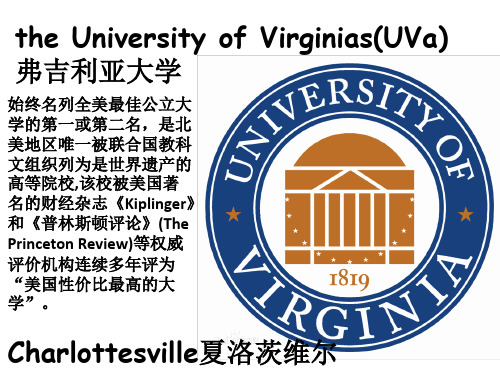
始终名列全美最佳公立大 学的第一或第二名,是北 美地区唯一被联合国教科 文组织列为是世界遗产的 高等院校,该校被美国著 名的财经杂志《Kiplinger》 和《普林斯顿评论》(The Princeton Review)等权威 评价机构连续多年评为 “美国性价比最高的大 学”。
Charlottesville夏洛茨维尔
Bella DePaulo The Truth About Liars 说谎者的真相
volunteer
Eg:He volunteered a statement to the police. 他自动向警方供出情况。 They volunteer for good causes. 她们自愿做好事。 volunteer sth. for\as sth. 自愿做…;义务做…;无偿做… volunteer sb. for\as sth. (未经当事人同意)举荐 voluntary adj. 志愿的,自愿的
strikingly
Eg:In one respect, however, the men really were strikingly similar. 然而,一方面,那些男人真的非常相似。 a strikingly handsome man 绝色美男
preoccupation
Eg:She spoke slowly, in a state of preoccupation. 她说话慢吞吞的,显得心事重重。 It was hard for him to be aware of her; he kept sinking back into black preoccupation. 他很难意识到她的存在;他一直沉浸在沮丧中。
综合教程第三册课后翻译习题参考答案
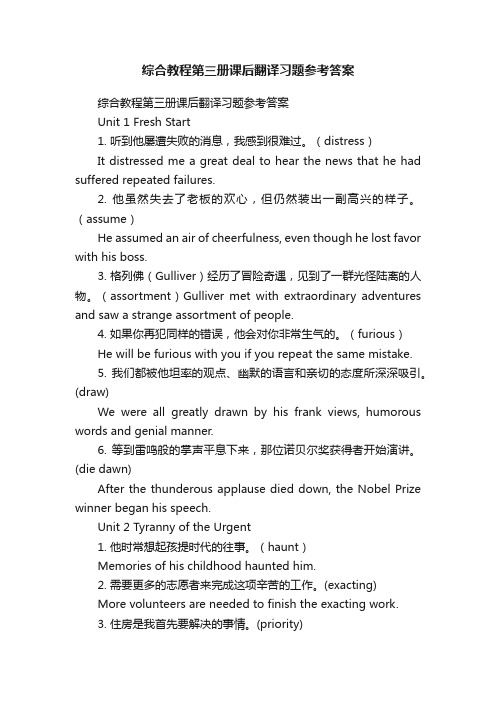
综合教程第三册课后翻译习题参考答案综合教程第三册课后翻译习题参考答案Unit 1 Fresh Start1. 听到他屡遭失败的消息,我感到很难过。
(distress)It distressed me a great deal to hear the news that he had suffered repeated failures.2. 他虽然失去了老板的欢心,但仍然装出一副高兴的样子。
(assume)He assumed an air of cheerfulness, even though he lost favor with his boss.3. 格列佛(Gulliver)经历了冒险奇遇,见到了一群光怪陆离的人物。
(assortment)Gulliver met with extraordinary adventures and saw a strange assortment of people.4. 如果你再犯同样的错误,他会对你非常生气的。
(furious)He will be furious with you if you repeat the same mistake.5. 我们都被他坦率的观点、幽默的语言和亲切的态度所深深吸引。
(draw)We were all greatly drawn by his frank views, humorous words and genial manner.6. 等到雷鸣般的掌声平息下来,那位诺贝尔奖获得者开始演讲。
(die dawn)After the thunderous applause died down, the Nobel Prize winner began his speech.Unit 2 Tyranny of the Urgent1. 他时常想起孩提时代的往事。
(haunt)Memories of his childhood haunted him.2. 需要更多的志愿者来完成这项辛苦的工作。
Unit 5 The Real Truth about Lies综合教程三

Audiovisual Supplement Cultural Information
But that’s a white lie White lie That’s the kind you want to tell, a white lie White lie So your mom won’t have to yell, a white lie White lie Everybody does it ‘cause it feels all right And it’s more polite But a lie’s still a lie Even when it’s white
Detailed Reading
The Real Truth about Lies
Randy Fitzgerald 1 At the University of Virginia in Charlottesville, psychology professor Bella DePaulo got 77 students and 70 townspeople to volunteer for an unusual project. All kept diaries for a week, recording the numbers and details of the lies they told. 2 One student and six Charlottesville residents professed to have told no falsehoods. The other 140 participants told 1535.
This is a piece of persuasive writing. It is of journalistic style.
(完整版)人教版高中英语必修五课文翻译
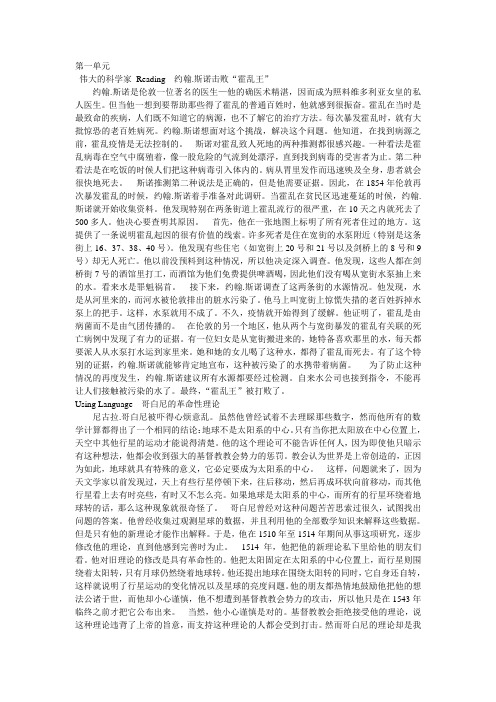
第一单元伟大的科学家Reading 约翰.斯诺击败“霍乱王”约翰.斯诺是伦敦一位著名的医生—他的确医术精湛,因而成为照料维多利亚女皇的私人医生。
但当他一想到要帮助那些得了霍乱的普通百姓时,他就感到很振奋。
霍乱在当时是最致命的疾病,人们既不知道它的病源,也不了解它的治疗方法。
每次暴发霍乱时,就有大批惊恐的老百姓病死。
约翰.斯诺想面对这个挑战,解决这个问题。
他知道,在找到病源之前,霍乱疫情是无法控制的。
斯诺对霍乱致人死地的两种推测都很感兴趣。
一种看法是霍乱病毒在空气中腐殖着,像一股危险的气流到处漂浮,直到找到病毒的受害者为止。
第二种看法是在吃饭的时候人们把这种病毒引入体内的。
病从胃里发作而迅速殃及全身,患者就会很快地死去。
斯诺推测第二种说法是正确的,但是他需要证据。
因此,在1854年伦敦再次暴发霍乱的时候,约翰.斯诺着手准备对此调研。
当霍乱在贫民区迅速蔓延的时候,约翰.斯诺就开始收集资料。
他发现特别在两条街道上霍乱流行的很严重,在10天之内就死去了500多人。
他决心要查明其原因。
首先,他在一张地图上标明了所有死者住过的地方。
这提供了一条说明霍乱起因的很有价值的线索。
许多死者是住在宽街的水泵附近(特别是这条街上16、37、38、40号)。
他发现有些住宅(如宽街上20号和21号以及剑桥上的8号和9号)却无人死亡。
他以前没预料到这种情况,所以他决定深入调查。
他发现,这些人都在剑桥街7号的酒馆里打工,而酒馆为他们免费提供啤酒喝,因此他们没有喝从宽街水泵抽上来的水。
看来水是罪魁祸首。
接下来,约翰.斯诺调查了这两条街的水源情况。
他发现,水是从河里来的,而河水被伦敦排出的脏水污染了。
他马上叫宽街上惊慌失措的老百姓拆掉水泵上的把手。
这样,水泵就用不成了。
不久,疫情就开始得到了缓解。
他证明了,霍乱是由病菌而不是由气团传播的。
在伦敦的另一个地区,他从两个与宽街暴发的霍乱有关联的死亡病例中发现了有力的证据。
有一位妇女是从宽街搬进来的,她特备喜欢那里的水,每天都要派人从水泵打水运到家里来。
- 1、下载文档前请自行甄别文档内容的完整性,平台不提供额外的编辑、内容补充、找答案等附加服务。
- 2、"仅部分预览"的文档,不可在线预览部分如存在完整性等问题,可反馈申请退款(可完整预览的文档不适用该条件!)。
- 3、如文档侵犯您的权益,请联系客服反馈,我们会尽快为您处理(人工客服工作时间:9:00-18:30)。
Unit 5The Real Truth about LiesRandy FitzgeraldAt the University of Virginia in Charlottesville, psychology professor Bella DePaulo got 77 students and 70 townspeople to volunteer for an unusual project. All kept diaries for a week, recording the numbers and details of the lies they told.One student and six Charlottesville residents professed to have told no falsehoods. The other 140 participants told 1,535.The lies were most often not what most of us would call earth-shattering. Someone would pretend to be more positive or supportive of a spouse or friend than he or she really was, or feign agreement with a relative's opinion. According to DePaulo, women in their interactions with other women lied mostly to spare the other's feelings. Men lied to other men generally for self-promoting reasons.Most strikingly, these tellers-of-a-thousand-lies reported that their deceptions caused them "little preoccupation or regret". Might that, too, be a lie? Perhaps. But there is evidence that this attitude toward casual use of prevarication is common.For example, 20,000 middle- and high-schoolers were surveyed by the Josephson Institute of Ethics--a nonprofitorganization in Marina del Rey, California, devoted to character education. Ninety-two percent of the teenagers admitted having lied to their parents in the previous year, and 73 percent characterized themselves as "serial liars", meaning they told lies weekly. Despite these admissions, 91 percent of all respondents said they were "satisfied with my own ethics and character".Think how often we hear the expressions "I'll call you" or "The check is in the mail” or "I'm sorry, but he stepped out". And then there are professions-- lawyers, pundits, PR consultants--whose members seem to specialize in shaping or spinning the truth to suit clients' needs.Little white lies have become ubiquitous, and the reasons we give each other for telling fibs are familiar. Consider, for example, a Southern California corporate executive whom I'll call Tom. He goes with his wife and son to his mother-in-law's home for Thanksgiving dinner every year. Tom dislikes her “special”pumpkin pie intensely. Invariably he tells her how wonderful it is, to avoid hurting her feelings."What's wrong with that?" Tom asked Michael Josephson, president of the Josephson Institute. It's a question we might all ask.Josephson replied by asking Tom to consider the lie from hismother-in-law's point of view. Suppose that one day Tom's child blurts out the truth, and she discovers the deceit. Will she tell her son-in-law, "Thank you for caring so much?" Or is she more likely to feel hurt and say, "How could you have misled me all these years? And what else have you lied to me about?"And what might Tom's mother-in-law now suspect about her own daughter? And will Tom's boy lie to his parents and yet be satisfied with his own character?How often do we compliment people on how well they look, or express our appreciation for gifts, when we don't really mean it? Surely, these "nice" lies are harmless and well intended, a necessary social lubricant. But, like Tom, we should remember the words of English novelist Sir Walter Scott, who wrote, "What a tangled web we weave, when first we practice to deceive."Even seemingly harmless falsehoods can have unforeseen consequences. Philosopher Sissela Bok warns us that they can put us on a slippery slope. "After the first lies, others can come more easily,” she wrote in her book Lying: Moral Choice in Public and Private Life. “Psychological barriers wear down; the ability to make more distinctions can coarsen; the liar's perception of his chances of being caught may warp."Take the pumpkin pie lies. In the first place, it wasn't just thathe wanted his mother-in-law to feel good. Whether he realized it or not, he really wanted her to think highly of him. And after the initial deceit he needed to tell more lies to cover up the first one.Who believes it anymore when they're told that the person they want to reach by phone is "in a meeting"? By itself, that kind of lie is of no great consequence. Still, the endless proliferation of these little prevarications does matter.Once they've become common enough, even the small untruths that are not meant to hurt encourage a certain cynicism and loss of trust. "When (trust) is damaged,”warns Bok, “the community as a whole suffers; and when it is destroyed, societies falter and collapse."Are all white lies to be avoided at all costs? Not necessarily. The most understandable and forgivable lies are an exchange of what ethicists refer to as the principle of trust for the principle of caring, "like telling children about the tooth fairy, or deceiving someone to set them up for a surprise party," Josephson says. "Still, we must ask ourselves if we are willing to give our friends and associates the authority to lie to us whenever they think it is for our own good."Josephson suggests a simple test. If someone you lie to finds out the truth, will he thank you for caring? Or will he feel his long-termtrust in you has been under-mined?And if you're not sure, Mark Twain has given us a good rule of thumb. "When in doubt, tell the truth. It will confound your enemies and astound your friends."谎言的真相兰迪·菲茨杰拉德1. 在夏洛特斯维尔的弗吉尼亚大学里,心理学教授贝拉·德保罗组织了77名学生和70名市民志愿参加一个特别的项目。
